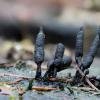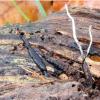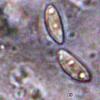
24-02-2026 11:01
Gernot FriebesHi,found on a branch of Tilia, with conidia measur

23-02-2026 11:22
Thomas Læssøehttps://svampe.databasen.org/observations/10584971

29-11-2024 21:47
Yanick BOULANGERBonjourJ'avais un deuxième échantillon moins mat

07-02-2023 22:28
Ethan CrensonHello friends, On Sunday, in the southern part of

19-02-2026 17:49
Salvador Emilio JoseHola buenas tardes!! Necesito ayuda para la ident

19-02-2026 13:50
Margot en Geert VullingsWe found this collection on deciduous wood on 7-2-
X. rhopaloides
Menno Boomsluiter,
01-03-2021 17:01
I was wondering, if any, what the status of Xylaria rhopaloides is in Europe.
It is not present in the key by mr. Fournier. Maybe he can shed light on it.
The species is present in the book of Bertault.
Greetings,
Menno
Jacques Fournier,
01-03-2021 20:23

Re : X. rhopaloides
Hi Menno,
if I were you, I would forget about Bertault and his crappy species concepts.
X. rhopaloides is an ill-defined an dubious tropical or subtropical species, variously interpreted, referred to X. curta by Dennis, to X. castorea by Ju & Rogers.
However, if you found something in your region recalling X. rhopaloides sensu Bertault, please show it on the forum, with details on surface anatomy and ascospore morphology.
Cheers,
Jacques
Menno Boomsluiter,
10-03-2021 19:28
Re : X. rhopaloides
Hello Jacques,
Thank for your clear answer.
I was asked to confirm a find of X. rhopaloides. In the abcense of any accessible key I started wondering whether this species excisted in Europe at all. The before mentioned collection brought me straight to X. hypoxylon thsmks to your excellent key.
Spores:(9,9) 10,6 - 11,9 (14) × (3,8) 4,4 - 5,1 (5,3) µm
Q = (2) 2,2 - 2,6 (2,8) ; N = 15
Me = 11,3 × 4,7 µm ; Qe = 2,4
Q = (2) 2,2 - 2,6 (2,8) ; N = 15
Me = 11,3 × 4,7 µm ; Qe = 2,4
I sent you two photo's no1 the collection which I have keyed out as X. hypoxylon.
no2. a collection presumed to be X. rhopaloides.
Thank you very much for your help



